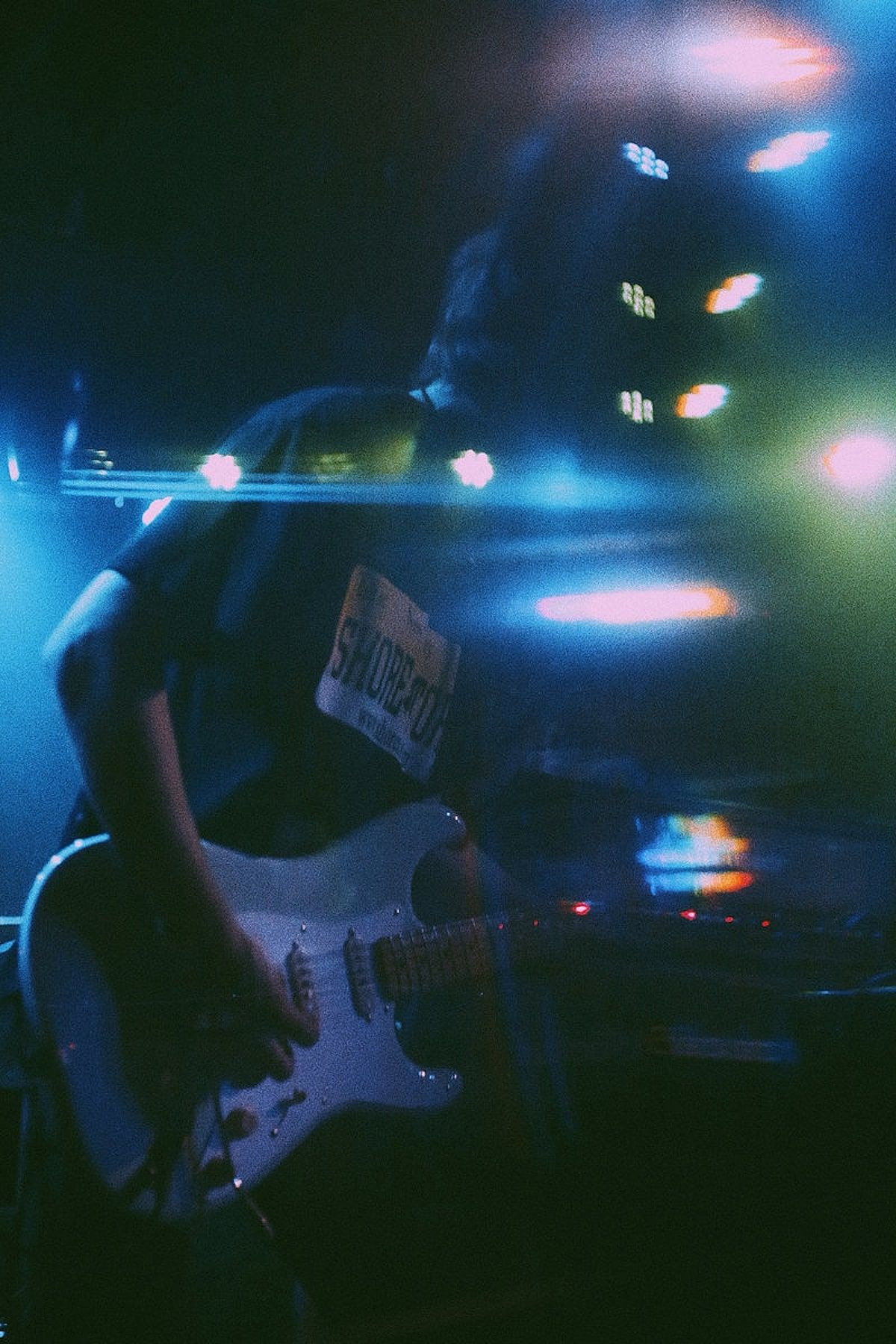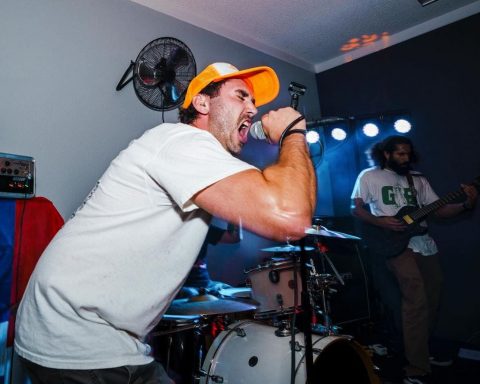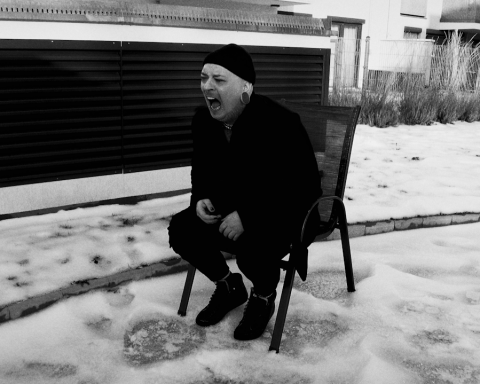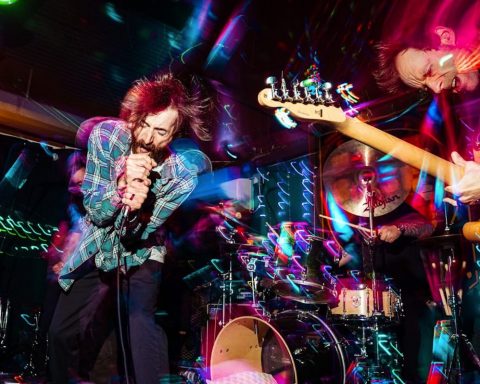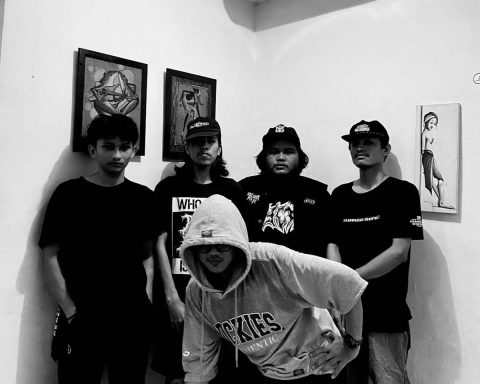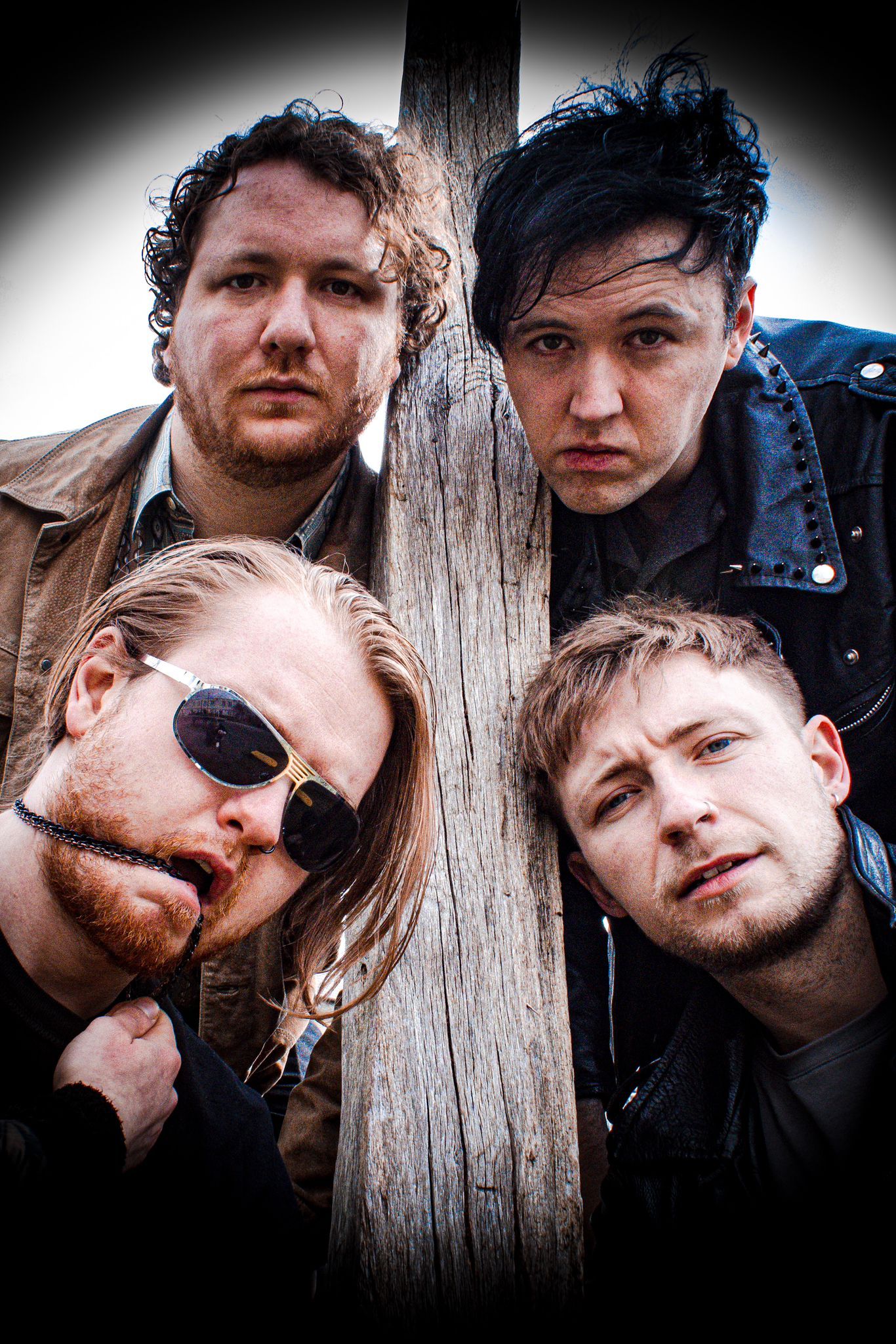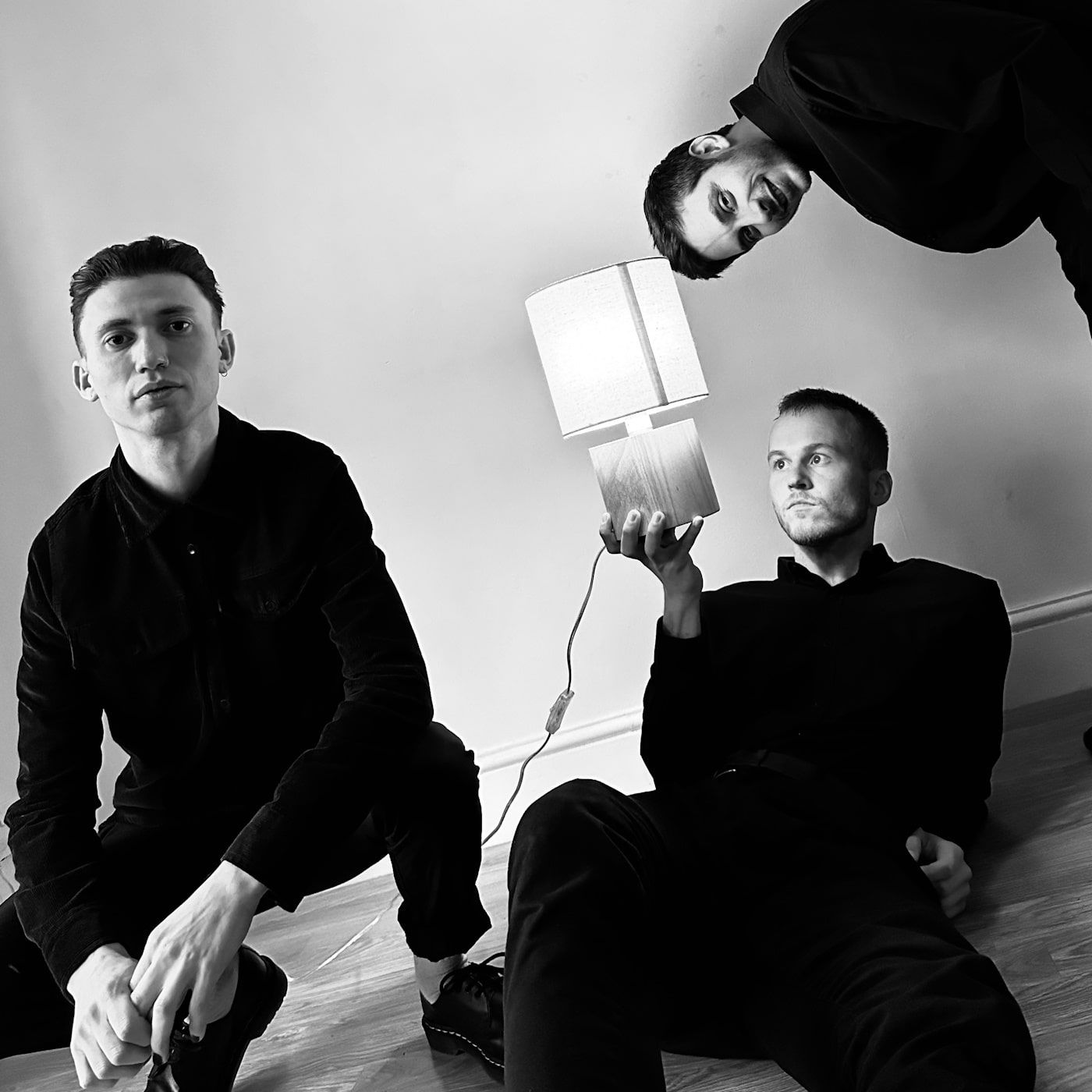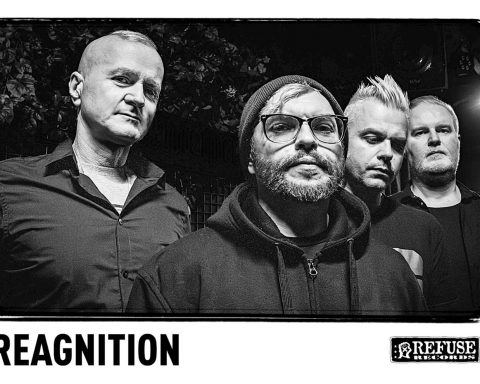Transforming from the previous identity of SØNØS, MEZMER ventures into new sonic territories, where the rock spirit of yesteryears blends with the contemplative and immersive experience of introspection and ethereal soundscapes. MEZMER’s debut EP, highlighted by tracks like ‘Your Head Spins Loudly as it Dulls’ and ‘SUPERMOON’, offers a narrative odyssey through the landscapes of loss, and the ephemeral nature of connection.
In an exclusive interview, MEZMER delves into the profound shift from SØNØS to the current sonic identity, describing it as a reframing of musical expressions rather than a departure. Raised on the quintessential rock of Led Zeppelin and Black Sabbath, MEZMER finds a rock and roll spirit imbuing all creative endeavors, despite the varied “sounds” these projects manifest.
His recent single ‘SUPERMOON’ explores the facades and illusions surrounding the “good life,” narrating the consequences of pursuing earthly desires to the detriment of genuine connection and humanity.
Despite achieving a sound that resonates with the underground community, MEZMER humbly sidesteps discussions on balancing authenticity with broader appeal, focusing instead on the music’s genuine expression.
The enigmatic spirit of Toledo, Ohio, the “Black Swamp,” infuses MEZMER’s music with a haunting and evocative ambiance, reflecting the region’s gloomy overcast and introspective atmosphere.
Looking ahead, MEZMER teases the themes of the upcoming debut full-length record, exploring the duality of love in its purest and most tumultuous forms. The forthcoming music promises a deeper exploration of guitar layering, offering a more intricate and immersive sonic experience.
As live performances loom on the horizon for 2024, MEZMER anticipates translating the intimate nature of the recorded work to the dynamic energy of live shows, ensuring each performance stands autonomously yet true to the studio essence. Collaborations, such as the time spent with Hotel Books, have instilled a sense of community, honesty, and authenticity in crafting MEZMER’s music, emphasizing the importance of remaining true to one’s authentic self.
With aspirations to connect with communities and individuals who resonate with MEZMER’s message, the artist envisions a positive impact through live performance, collaboration, and artistic expression, aiming to provide comfort, peace, and acceptance in a world often devoid of such qualities.
Dive into the depths of MEZMER’s introspective journey, where each track serves as a conduit for exploring the complex interplay of emotional turmoil, the quest for clarity, and the inherent beauty of the human experience.
Here’s our full interview.
The transformation from “SØNØS” to MEZMER marks a profound shift in sonic identity. Could you walk us through that metamorphosis and how it’s reflected in your current sound?
The shift in sonic identity from SØNØS to MEZMER was debatably more akin to a reframing rather than a departure. I was raised on rock and roll. Led Zeppelin, Black Sabbath, my first concert was KISS.
So despite my journey across the genres throughout my life, I would say that there is a rock and roll spirit that lives within it all, despite the “sound” it manifests itself in. In some ways, the projects are very similar – in other ways, they have landed at entirely different destinations. I think most importantly was asking myself “who am I, today?”
After “identifying” as SØNØS for six or so years, it was hard to tell where I would head if I was just starting out today. The first few MEZMER songs seemed to give me that feeling of “dancing like nobody is watching”, and revealed themselves to me.
Can you elaborate on the creative process that leads to capturing such an ethereal yet intense vibe as the one pictured in your debut single ‘Your Head Spins Loudly as it Dulls’?
The creative process that led to “YOUR HEAD SPINS..” was very interesting looking back. I had been deeply committed to writing a record for SØNØS that sounded nothing like what would eventually become YHSLAID.
So much so, that I walked in the studio one day and told myself “I’m going to write a song for nobody, a song nobody is ever going to hear”. Ironically, that song ended up being YHSLAID. I remember turning on every pedal that I had on my pedalboard and just letting a chord ring out. It felt so abundant and hypnotic, it sounded like slipping from reality.
The song is largely a metaphorical journey for “losing your mind”, or rather, sinking so deep into yourself that you lose touch with reality.
I think this quote by Alan Watts summarizes the sentiment of the song well: “A person who thinks all the time has nothing to think about except thoughts. So, he loses touch with reality and lives in a world of illusions.”
Your newest offering, “SUPERMOON”, is a narrative odyssey through loss and introspection. What personal experiences or philosophies influenced the lyrical direction of this haunting track?
SUPERMOON is a confessional of sorts to the facades and illusions of the “good life”. All that glitters; the money, fame, status, ego, and pride. It tells a story of what happens when you fly too close to the sun in pursuit of earthly desires, and the inevitable suffering and isolation that it leads to when living a life constantly trying to fill the void. In the end, you find yourself even more alone than you were to begin with.
How does the “Black Swamp” of Toledo, Ohio, imbue your music with its enigmatic spirit, and how do you transpose that into an audible experience?
The enigmatic spirit of the black swamp seems to come alive in all of the music that comes of it. Whether its the gloomy overcast of the midwest, or the shallow, shipwrecked Lake Erie, something both haunting and evocative lives in the air here.
For MEZMER personally, I believe it assimilates the environment its bred in, and results in a foggy, introspective and dark color pallet.
You’ve achieved an acoustic and reimagined version of your music in response to listener demand. What’s your approach to reworking songs, and how do you ensure they retain their core essence?
When reworking SUPERMOON for the acoustic version, it was very important to me that the song be able to stand on its own two feet, and not just exist as an extension of the original.
That being said, I didn’t want to abandon the original spirit of the song in the process. As result, the song has many stylistic differences to the original, beginning with a slightly altered tuning to create a more open feeling throughout, and a slightly more subdued tempo.
Luckily, the skeleton of the song is simple enough that it allowed for a lot of exploration while still feeling like the same song. It gave me a chance to honor and implement some of the sonic characteristics that were definitive to SØNØS, in an organic and intentional way. Rather than just saying, “hey, look at me, we also do this”.
How do you hope listeners will navigate the themes of loss, introspection, and the ephemeral nature of connection, as the one portrayed in your new single?
I hope the reaction to the theme of such a bleak and somewhat desolate track as SUPERMOON is one of hope, connectedness, and peace; not one of hopelessness, isolation, and general nihilism.
Despite the defoliated subject matter in the song, the duality of the message is that where you are now can be enough. Who you are can be enough, and that you are more than what you have.
We are so much more than our belongings, our status, our money, our vessels, and despite the temptation, it is not worth losing your humanity in pursuit of something that lives outside of yourself.
Your lyrics often grapple with the tension between emotional tumult and the quest for clarity. How does songwriting serve as a tool for you to sift through this dichotomy?
Songwriting serves as a tool to help me navigate the dichotomy of emotional tumult and clarity by providing myself a personal safe place to explore the questions that would otherwise just reverberate off of themselves.
Some questions have no answers, and we can lose ourselves in the process of trying to force an answer that doesn’t exist. It can create an insatiable loop that results in eternal dissatisfaction and confusion.
Through songwriting, and art as a whole, you are able to set down some of those things; you are no longer forced to carry them with you. At least that is how it feels.
As you chip away at your debut full-length record, can you give us a glimpse into the themes and stories you’re planning to explore?
I don’t want to go into too much detail as the concept reveals itself more and more to me everyday, and may be an entirely different beast by the time it sees the light of day – but as of now the theme is rooted in the duality of love.
The way it operates in its purest form and how it exists as an omnipresent and formless entity, pure like water. On the opposite end of the spectrum, love can uproot feelings of jealousy, bitterness, rigidity, and pain. It can feel like teeth, it can be brittle; what was once liberating and harmonious suddenly feels like an opposition to gravity.
The record aims to explore this concept sonically.
In the crafting of your upcoming full-length record, are there new sonic territories you’re exploring or particular instruments that have become central to the MEZMER sound?
So far, the largest extension of the MEZMER sound that has been cultivated in the new record has been a deeper utilization of the possibilities of layering guitar.
The first few MEZMER songs are relatively cut-dry when it comes to the instrumentals, while the new music seems to embody a more intricate, progressive and immersive experience.
With live performances on the horizon, how do you translate the intimate and introspective nature of your recorded work to the energy of a live audience?
The energy of our live performance is entirely autonomous to the recorded work. When it comes to the SØNØS discography for example, the tracks are littered with subdued hip-hop beats, while the live versions are emphasized by hard-hitting live drums. Similarly with MEZMER, we are finding that the songs themselves are able to transcend their studio encasement and step into their own space in a live setting.
Could you share how collaborating with other artists, like your time with Hotel Books, has influenced the way you craft MEZMER’s music today?
My time collaborating with other artists, specifically my time touring with Hotel Books taught me so much about the music industry, and the importance of community and honesty in the artistic space.
Cam (the vocalist of Hotel Books), is one of my closest friends, and he was able to introduce me to a lot of the lesser known aspects of the music industry as well as push me to always remain true to my authentic self despite what the pressure may be to conform otherwise.
He reminded me to see the art in myself, rather than myself in the art – and that is something that has stuck with me over the years.
View this post on Instagram
With your debut record on the horizon and live shows slated for 2024, can you share any long-term visions or aspirations you have for MEZMER’s place in the music world?
Long term, I want to connect with other communities and individuals who resonate with the message that we stand for.
Whether that be through live performance, collaboration, or the work itself; it’s very important to me that MEZMER’s place in the world be a positive one that provides people with comfort, peace, and acceptance in a cold, cruel world.



